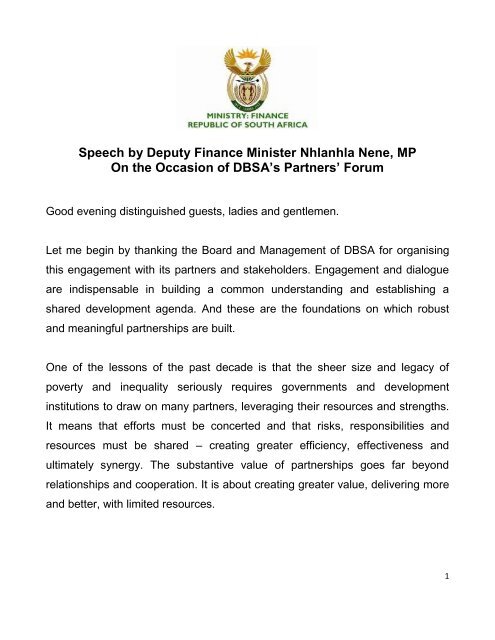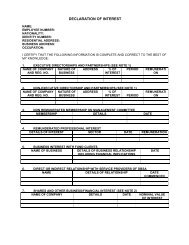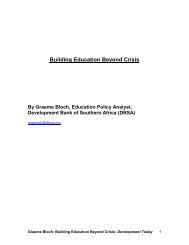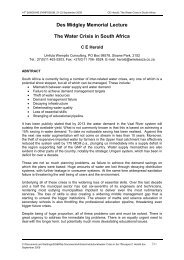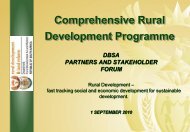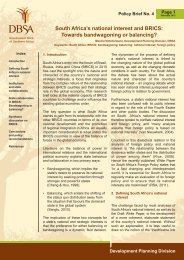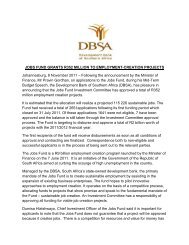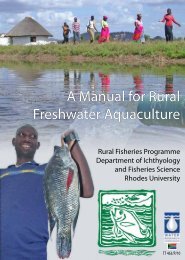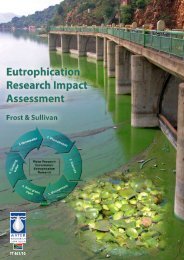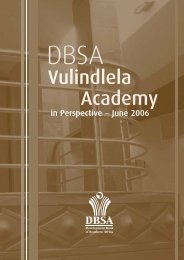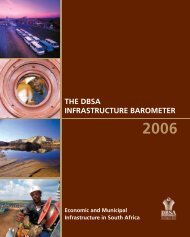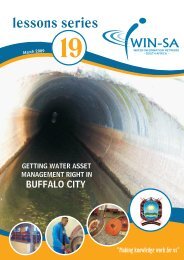Speech by Deputy Finance Minister Nhlanhla Nene, MP On the ...
Speech by Deputy Finance Minister Nhlanhla Nene, MP On the ...
Speech by Deputy Finance Minister Nhlanhla Nene, MP On the ...
Create successful ePaper yourself
Turn your PDF publications into a flip-book with our unique Google optimized e-Paper software.
<strong>Speech</strong> <strong>by</strong> <strong>Deputy</strong> <strong>Finance</strong> <strong>Minister</strong> <strong>Nhlanhla</strong> <strong>Nene</strong>, <strong>MP</strong><strong>On</strong> <strong>the</strong> Occasion of DBSA’s Partners’ ForumGood evening distinguished guests, ladies and gentlemen.Let me begin <strong>by</strong> thanking <strong>the</strong> Board and Management of DBSA for organisingthis engagement with its partners and stakeholders. Engagement and dialogueare indispensable in building a common understanding and establishing ashared development agenda. And <strong>the</strong>se are <strong>the</strong> foundations on which robustand meaningful partnerships are built.<strong>On</strong>e of <strong>the</strong> lessons of <strong>the</strong> past decade is that <strong>the</strong> sheer size and legacy ofpoverty and inequality seriously requires governments and developmentinstitutions to draw on many partners, leveraging <strong>the</strong>ir resources and strengths.It means that efforts must be concerted and that risks, responsibilities andresources must be shared – creating greater efficiency, effectiveness andultimately synergy. The substantive value of partnerships goes far beyondrelationships and cooperation. It is about creating greater value, delivering moreand better, with limited resources.1
Let me take this opportunity to reflect on <strong>the</strong> changed context of developmen<strong>the</strong>re in South Africa and <strong>the</strong> wider region over <strong>the</strong> last two years. As aneconomy, we still face classical challenges of a developing economy: too fewresources chasing too many social and economic challenges. The need forfocus and prioritisation cannot be over-emphasised.While economic impairment arising from <strong>the</strong> financial crisis has not been of apermanent nature, <strong>the</strong> recovery from this requires conscious orchestration, anda focused approach, to avoid fur<strong>the</strong>r regression, and to <strong>the</strong>re<strong>by</strong> ensure SouthAfrica takes <strong>the</strong> opportunity to be buoyed <strong>by</strong> global recovery.Despite <strong>the</strong> fact that <strong>the</strong> worst of <strong>the</strong> financial crisis and downturn is behind us, itremains a fact that <strong>the</strong> demand for resources is at its peak. Accordingly, <strong>the</strong>imperative for effectiveness has never been greater. Our considered view inGovernment is that, as <strong>the</strong> role of <strong>the</strong> state is streng<strong>the</strong>ned to championdevelopment more vigorously, state-owned enterprises, including developmentbanks, will have a more critical role to play.The matter of <strong>the</strong> role and effectiveness of state owned enterprises (SOEs) anddevelopment finance institutions (DFIs) has been in <strong>the</strong> public discourse forsome time now. Objectively, <strong>the</strong> government seeks to eliminate poorgovernance and <strong>the</strong> wastage of resources where this is evident. It also seeks toensure <strong>the</strong> alignment of <strong>the</strong>se key public institutions to <strong>the</strong> social and economicobjectives of Government.2
Much has been observed and said on <strong>the</strong> performance of SOEs and DFIs, but itmay not be apparent to <strong>the</strong> general public yet that <strong>the</strong>re is significantly greaterconsensus and emerging clarity on <strong>the</strong> mandates and foci of public enterprise ingeneral, as a result of intense engagements <strong>by</strong> supervising Ministries.Similarly, it has been observed that <strong>the</strong> state’s machinery is notorious for itsuncoordinated approach to delivery of its mandated objectives. In anenvironment where resources are scarce, co-ordination and prioritisation ofobjectives is of primary importance. The introduction of performanceagreements for all state departments and DFIs, while engenderingaccountability, will assist in ensuring common objectives, planning and acoordinated approach to delivery. This will equally ensure that resources suchas SOEs and DFIs are optimally deployed towards key government objectives.South Africa needs stronger and smarter partnerships to increase investmentsin infrastructure development and public goods, to stimulate local economicdevelopment, and to generate as many jobs as possible, especially jobs thatcan absorb <strong>the</strong> large and growing numbers of unemployed youth. Suchpartnerships should enable greater developmental outreach faster, and alsohelp create better conditions for fur<strong>the</strong>r investment and innovation.3
I have over <strong>the</strong> past year taken a deliberate interest in <strong>the</strong> Development Bank ofSou<strong>the</strong>rn Africa (DBSA). Noting that DBSA has credibly carried out its mandate,and has been amongst institutions that government broadly has relied upon foraddressing both social and economic challenges, we have resolved that DBSAmust focus on <strong>the</strong> government’s infrastructure agenda, and <strong>by</strong> consequence,<strong>the</strong> DBSA needed to align its strategy accordingly. The Bank must become acentre of excellence on infrastructure.DBSA’s role is to champion socio-economic transformation throughinfrastructure and economic development, with emphasis on enabling servicedelivery, regional integration and job creation.In this regard, I am pleased that <strong>the</strong> Bank has accepted a number of keyinfrastructure programs that are reflective of its expanded performance plan, keyamongst which are:a) working with National Treasury on <strong>the</strong> development of Health PPPs across<strong>the</strong> country, as follow-up of <strong>the</strong> adopted Health road mapb) assisting <strong>the</strong> Department of Water Affairs in planning and co-financing <strong>the</strong>expansion and rehabilitation of water and sanitation infrastructure to helpensure that <strong>the</strong>re is no crisis in this area4
c) assisting <strong>the</strong> Department of Education in planning and co-financing <strong>the</strong>eradication of mud-schools throughout <strong>the</strong> country. School infrastructurerequires special attention in line with <strong>the</strong> education roadmap. The DBSAis working on a program to assist provinces to expand sustainableinfrastructure for educationd) promotion of green energy and support of large scale roll-out of demandside management to reduce energy consumption, in response to <strong>the</strong>country’s carbon reduction targets. The Bank has adopted this new thrustin consultation with National Treasury and <strong>the</strong> Department of Energy.The Bank has also accepted <strong>the</strong> need to innovate and evolve fur<strong>the</strong>r its regionalapproach to infrastructure and economic development. Key in this regard isbuilding deeper institutional partnerships with regional stakeholders, financialinstitutions and international development partners. I am pleased to announcethat DBSA’s regional development work will soon be taken to ano<strong>the</strong>r level, as anew regionally-focused structure is created to enable <strong>the</strong> DBSA to better serve<strong>the</strong> cause of regional economic development and integration.This is being done to enable <strong>the</strong> region to leverage greater resources and toadvance priority infrastructure projects in support of trade and shared regionalresources, be it in terms of clean hydro or solar power, cross-border roads orcross-border river basins. It will enable better focus, better engagement andenhanced risk management. Stronger partnerships are key to <strong>the</strong> building ofadditional institutional, financial and technical capacity that will enable <strong>the</strong> regionto drive its integration and transformation agenda.5
The Ministry of <strong>Finance</strong> will be working closely with <strong>the</strong> Board and Managementto ensure that <strong>the</strong>se important programs and initiatives are implemented andthat <strong>the</strong> Bank is ably resourced to execute on its expanded mandate.In conclusion, ladies and gentlemen, let me take this opportunity to pay tribute toJay Naidoo, <strong>the</strong> outgoing Chairman of <strong>the</strong> DBSA Board of Directors. The DBSAhas thrived and become a very strong development institution under hisleadership over <strong>the</strong> past decade. The success of <strong>the</strong> DBSA is testimony to <strong>the</strong>quality of <strong>the</strong> leadership that he has provided. Jay, it is a pleasure to convey mysincere and wholehearted appreciation to you for your meaningful andsignificant contribution to <strong>the</strong> success of <strong>the</strong> DBSA.Let me end <strong>by</strong> commending <strong>the</strong> Board, Management and staff of <strong>the</strong> DBSA for<strong>the</strong>ir devotion and achievements. As your principal shareholder representative, Ilook forward to more achievements and <strong>the</strong> setting of new benchmarks indevelopment activism.Thank you.6


